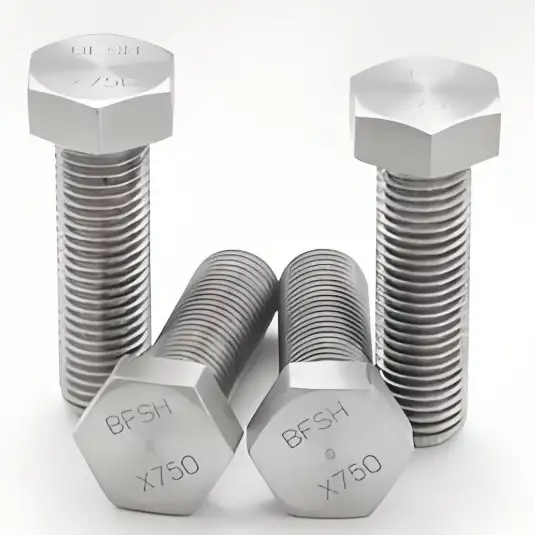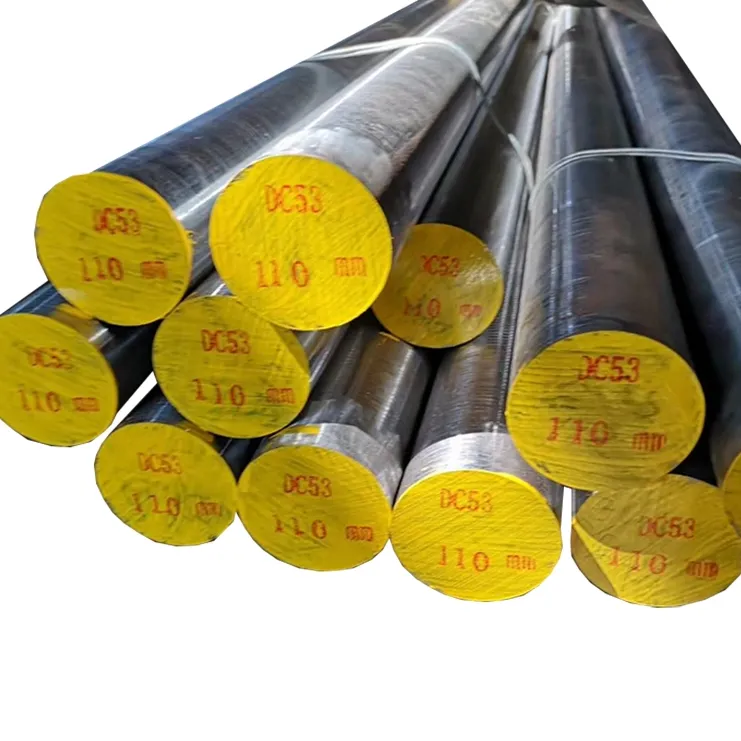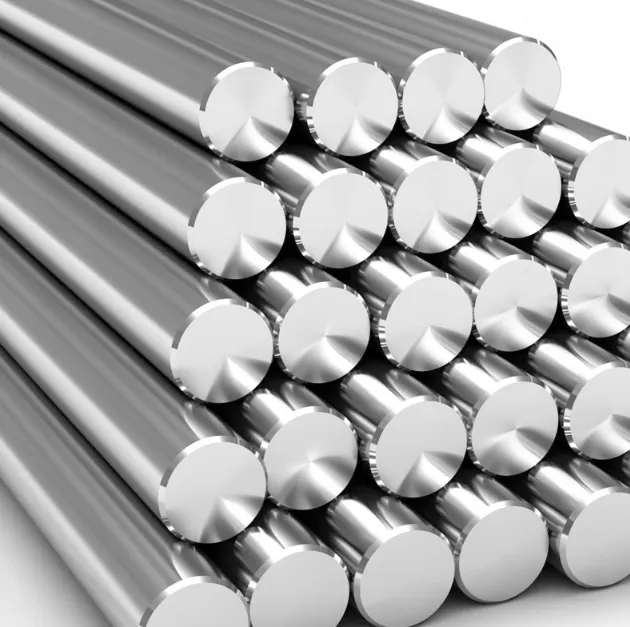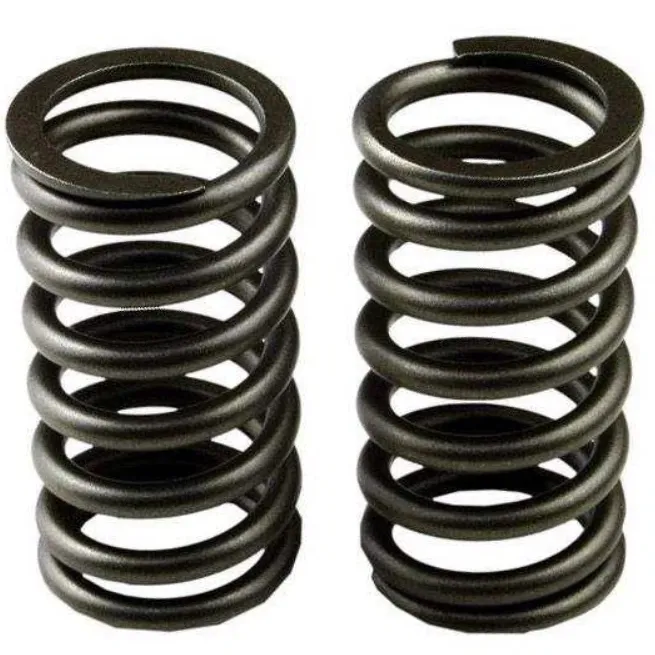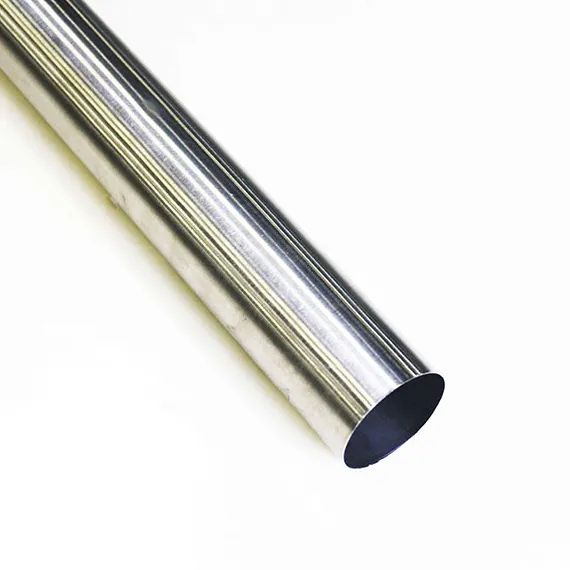Inconel bolts are premium nickel-based superalloy fasteners built for corrosive, high-temperature and high-stress environments. For corrosive service and marine/chemical process parts, Inconel 625 is typically preferred because of exceptional corrosion resistance and good strength at elevated temperatures; for very high strength, creep-resistant fasteners used in gas turbines and aerospace, Inconel 718 (precipitation-hardenable) is the usual choice. In short: pick the grade to match the operating environment — 625 for corrosion and temperature stability, 718 when mechanical strength and creep resistance dominate.
What are Inconel bolts?
“Inconel” is the trademarked family name for a group of nickel-chromium (nickel-based) superalloys developed for resistance to oxidation and corrosion plus retained mechanical strength at elevated temperature. When manufactured into bolts, screws, studs and nuts, these alloys produce fasteners that keep preload, resist stress-corrosion cracking and survive in hot, aggressive media where carbon steels or common stainless grades would fail. Inconel fasteners are available in common fastener geometries (hex bolts, socket heads, studs, eye bolts, flanges) and are produced to industry standards or to customer drawings.
Common Inconel grades for fasteners
-
Inconel 625 (UNS N06625) — excellent general corrosion resistance (including seawater and acids), strong at high temperature without precipitation hardening; often selected where corrosion + strength are both required.
-
Inconel 718 (UNS N07718) — precipitation-hardening superalloy with superior tensile, yield and creep strength at elevated temperature; used where high mechanical performance is paramount (turbines, aerospace bolts).
-
Inconel 600 (UNS N06600) — good oxidation and corrosion resistance; used for heat exchangers and some fasteners where a slightly lower cost solution to 625 is acceptable.
-
Other grades (e.g., 625L, X-750, 686) — niche choices for special requirements (minor variations in composition or processing to tune properties).
Selection rule of thumb: if corrosion environment (chlorides, acids, seawater) is the dominant problem — favor 625; if extreme mechanical strength and creep resistance at high temperature are needed — favor 718. Verify required tensile/yield, environmental exposure and any regulatory specs (e.g., AMS, ASTM) before finalizing.
Material properties
Below is a compact properties snapshot for the two most common fastener grades (typical values; consult supplier MTCs for specification-level design):
| Property | Inconel 625 (typical) | Inconel 718 (typical) |
|---|---|---|
| Density (g/cm³) | 8.44 | ~8.19–8.25 (varies by heat/treatment) |
| Melting range | 1290–1350 °C (2350–2460 °F) | ~1260–1336 °C (2300–2440 °F) |
| Typical tensile strength (room T) | 827–1034 MPa (depending on product form & heat) | Often 900–1400 MPa (precipitation-treated 718 yields much higher strengths) |
| Yield strength (0.2% offset) | 290–655 MPa (condition dependent) | ~520–1200 MPa (aged 718 higher) |
| Service temperature | Cryogenic up to ~982 °C for 625; excellent stability up to ~650–700 °C for many uses | Designed for high-temperature structural use; retains strength up to ~700–800 °C in many cases. |
| Corrosion resistance | Outstanding (pitting, crevice, chloride stress-corrosion cracking) | Very good, but 625 usually outperforms 718 in severely corrosive aqueous environments. |
| Machinability | Difficult (work hardening, low thermal conductivity — requires specific tooling and process control). |
Notes: these are typical values assembled from manufacturer technical bulletins and distributor data; exact values depend on product form, heat treatment, and batch testing. For design calculations, always use certified mill/test certificates and the controlling spec (AMS, ASTM, ISO).
Chemical composition
These are limiting/nominal compositions commonly quoted for fastener raw bar/feedstock. Composition tolerances depend on the specific spec (AMS/ASTM).
| Element (wt%) | Inconel 625 (UNS N06625) — typical limits | Inconel 718 (UNS N07718) — typical limits |
|---|---|---|
| Nickel (Ni) | ≈58.0 min | ≈50–55% (typical ≈52%) |
| Chromium (Cr) | 20.0–23.0 | ≈17–19% |
| Iron (Fe) | ≤5.0 (balance) | ≈18–20% (significant) |
| Molybdenum (Mo) | 8.0–10.0 | ~3% (trace varies) |
| Niobium (Nb) + Tantalum (Ta) | 3.15–4.15 | Columbium (Nb) + Ta ≈4–5% (used for age hardening) |
| Carbon (C) | ≤0.10 | Typically low (0.04–0.10 depending on spec) |
| Others (Ti, Al, Mn, Si, P, S) | Trace to small amounts; see manufacturer data sheets. |
Interpretation: 625 is heavily nickel-based with strong Mo and Nb additions to provide solid-solution strength and corrosion resistance without aging. 718 has higher iron and deliberate Nb/Ta + Ti/Al additions to allow precipitation hardening for high strength.
Machinability, forming and practical handling
Working with Inconel fasteners requires experienced machining practices. Key points:
-
Hard on tools. The alloy work-hardens at the cut, has low thermal conductivity and a tough microstructure — this increases cutting forces and accelerates tool wear. Use heavy-duty, coated carbide or ceramic tooling and keep speeds conservative.
-
Preferred parameters. Low cutting speeds, higher feed rates, rigid setups, positive rake tools and high-pressure coolant or flood coolant produce the best trade-off between tool life and productivity. Trochoidal milling or other constant-engagement strategies reduce heat buildup.
-
Cold forming/heading. Many Inconel grades are not ideal for cold heading due to their strength and work hardening. Forged or machined components from bar/rod are common for bolts; some suppliers cold-form smaller parts with specialized equipment.
-
Threading & heat treatment. Thread rolling is preferred where possible because it preserves grain flow and fatigue resistance; cutting threads on aged 718 is harder. For 718, controlled aging/solution treatment is essential to achieve specified mechanical properties.
Typical applications
-
Aerospace: turbine casings, engine mounts, high-temperature fasteners (718 often used).
-
Oil & gas / downhole: high-strength, corrosion-resistant studs and bolts for wellhead and downhole tools.
-
Marine & offshore: 625 for seawater systems, propulsors, and submerged hardware.
-
Chemical processing & power plants: heat exchangers, valves, pumps, and equipment exposed to oxidizing and reducing acids.
-
Nuclear: select fasteners for special components (when approved by regulatory specs).
Sizes and weights
Fasteners are supplied in standard metric and imperial sizes. Table below gives approximate weights per 1000 bolts for common hex-head cap screws (DIN/ISO style) in Inconel — values are estimates derived from standard steel weight charts then adjusted for Inconel density (Inconel 625 density 8.44 g/cm³) to reflect heavier material; use vendor weight certificates for shipping calculations. Base steel charts used for conversion: Fuller Fasteners weight tables (steel) + density correction factor ≈ 1.075 (Inconel/steel).
| Nominal (metric) | Example length (mm) | Approx. weight — Inconel (kg / 1000 bolts) |
|---|---|---|
| M8 × 30 | 30 | ≈ 13.0 kg / 1000 (steel chart ≈12.1 → ×1.075 ≈13.0) |
| M8 × 50 | 50 | ≈ 19–22 kg / 1000 (depends on head form) |
| M10 × 40 | 40 | ≈ 23–26 kg / 1000 |
| M12 × 50 | 50 | ≈ 50–60 kg / 1000 |
How to use: Multiply the listed kg/1000 by the number of thousands in your order to estimate gross material weight and shipping mass. For exacts, supply the fastener drawing and request a sample/packing list from the manufacturer.
Global price snapshot 2025 comparison
Fastener costs vary sharply with grade, size, heat treatment, quantity, and global metal market movements. The table below provides typical market ranges (2025) expressed both as USD/kg and indicative per-piece ranges for small fasteners — use these only for budgetary estimates. Prices will vary with order quantity (MOQ), finish, testing (MTC/PMI), and logistics. Sources: recent market writeups and online supplier listings.
| Region | Typical price range (USD per kg) — Inconel fasteners (2025) | Indicative small-bolt price (M8–M12) |
|---|---|---|
| United States | $80 – $140 / kg (higher for 718 and for small cut/machined parts) | $2.5 – $8.0 / piece (small qty, machined, tested). |
| Europe | $85 – $150 / kg (distribution and certification add margin) | $3.0 – $10.0 / piece (depending on grade & certification). |
| China (manufacturer FOB) | $60 – $110 / kg (factory quotes for bar/fasteners; prices can be lower for large MOQ). Example marketplace listings show small-piece prices very low (trade platform) but beware of quality variance. | $0.50 – $4.0 / piece (volume orders from Chinese factories; prices fall dramatically with quantity — verify MTCs). |
Why ranges are wide: Inconel raw bar cost, labour to machine/forge, heat treatment, testing (e.g., AMS 5662/5663 for 718), and logistics all affect final unit price. Smaller runs and strict traceability push the price toward the top end. For a project with many thousands of parts, negotiate long-term supply, raw material pass-through and batch testing to reduce unit cost.
Why pick MWAlloys for Inconel bolts
I am representing MWAlloys, a specialist producer and global supplier of superalloy fasteners. Key benefits we offer:
-
100% factory price — direct manufacturing eliminates distributor markups; competitive pricing with MOQ transparency.
-
In-stock & fast delivery — we maintain inventory of common Inconel grades (625, 718, 600) and standard sizes; faster lead times for short runs.
-
Quality control — full Mill Test Certificates (MTC), PMI/chemical reports on request, and traceable heat lot marking.
-
Customization — capacity for machined, forged, turned & threaded parts to customer drawings; support for special finishes and non-standard geometries.
-
China-based manufacturing with global logistics — we ship FOB China or arrange DDP full-service delivery to the U.S. and Europe.
Quality, standards and procurement checklist
When buying Inconel fasteners consider this checklist:
-
Specify grade and UNS number (e.g., Inconel 625 — UNS N06625; Inconel 718 — UNS N07718).
-
Request MTC (3.1 / 3.2 depending on region) — ensure chemical analysis and mechanical test results are included.
-
Ask for heat treatment / aging details (especially for 718 — define the exact AMS/ASTM heat treatment).
-
Confirm mechanical spec — tensile & yield requirements, hardness limits, salt spray or pitting resistance if relevant.
-
Decide thread method — rolled threads usually have better fatigue performance than cut threads.
-
Define non-destructive testing if needed (e.g., PMI, dye penetrant, hardness).
-
Agree packaging and traceability — heat number marking, bagged by lot, and packing list for customs.
-
Validate supplier references — demand sample MTCs and, if necessary, witness testing.
FAQs
1. Are Inconel bolts magnetic?
Most Inconel alloys are essentially non-magnetic in the annealed condition; certain cold-worked/aged conditions can show slight magnetic response, but for practical purposes Inconel 625 and 718 are treated as non-magnetic.
2. Which grade resists seawater best: 625 or 718?
625 is the preferred choice for seawater and chloride-rich environments because of superior pitting/crevice resistance.
3. Can Inconel bolts be heat treated after machining?
718 requires solution and aging to develop design strength; 625 is typically used in solution-treated or annealed condition and does not require precipitation aging. Coordinate heat treatment with the supplier before final machining if full property development is required.
4. How difficult are Inconel bolts to machine?
Challenging: low thermal conductivity and work-hardening behavior demand coated carbide/ceramic tooling, low speeds, rigid setups and effective coolant. Plan higher machining costs than for stainless steels.
5. Are Inconel fasteners available in standard ASTM/ISO forms?
Yes, many fasteners are produced to ISO, ASTM and AMS specifications; for aerospace use, AMS/ASTM/ASME specs commonly apply. Verify the exact spec in purchase orders.
6. Do Inconel bolts need special torque values?
Yes — torque tables for steel do not apply. Use supplier torque and preload charts specific to the grade and thread form; consider lubrication and galling mitigation measures (e.g., anti-seize) where appropriate.
7. Can you roll threads on Inconel 718?
Yes, but rolling aged 718 is harder; many manufacturers roll threads in controlled pre-aged conditions or machine threads post-ageing depending on mechanical requirements.
8. What certifications should I require for critical parts?
Ask for Mill Test Certificate (chemical & tensile), heat number traceability, and any required NDT reports (PMI, hardness, dye-penetrant). For aerospace, require AMS/ASME specific documentation.
9. How do I reduce cost for a large production run?
Buy direct from factory, standardize sizes, remove unnecessary heat treatments, increase order quantity, and allow the supplier to use optimized manufacturing routes (cold-heading where possible, batch heat treatment). MWAlloys can assist with cost models.
10. Are Inconel bolts worth the premium?
For applications where failure would be catastrophic (loss of containment, engine components, subsea systems) or where service life in corrosive/high-T environments is required, Inconel offers unmatched lifecycle value that often justifies the higher initial price.

